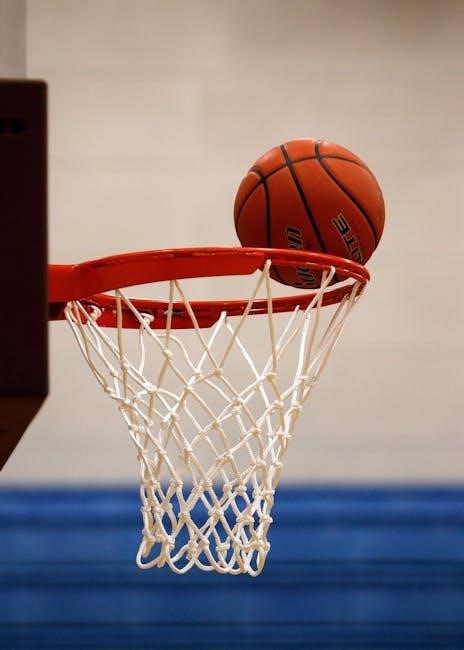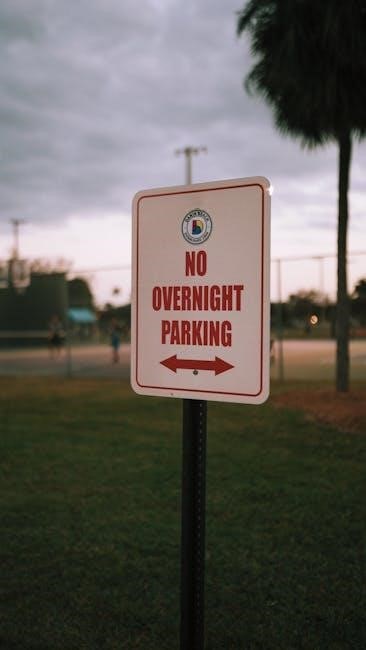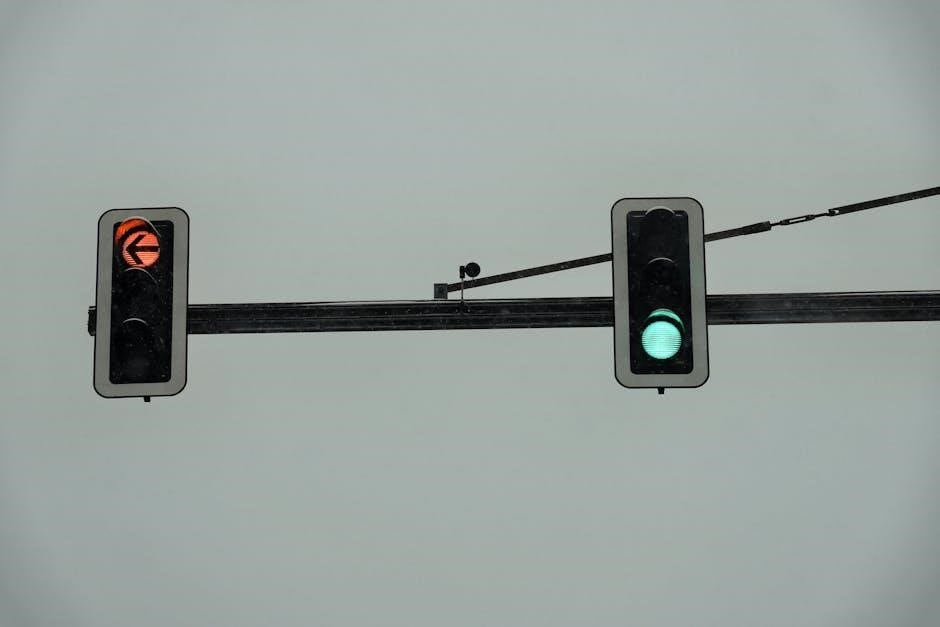
Basketball rules and regulations are essential for fair play, ensuring consistency across all levels. Governing bodies like FIBA, NBA, WNBA, and NCAA provide official guidelines, covering gameplay, equipment, and player conduct. These rules are regularly updated to enhance the sport’s integrity and enjoyment for players and fans worldwide.
1.1 Overview of Basketball as a Sport
Basketball is a dynamic team sport played by two teams of five players each, aiming to score by shooting a ball into the opponent’s hoop. Governed by rules set by FIBA, NBA, WNBA, and NCAA, it emphasizes skill, strategy, and physical fitness. The game is popular globally, with clear regulations ensuring fair play and consistent gameplay across all levels, from amateur to professional leagues. Understanding these rules is crucial for players, referees, and fans to fully appreciate the sport’s competitive and entertaining nature.
1.2 Importance of Rules in Basketball
Rules are fundamental to basketball, ensuring a fair and structured environment for all participants. They maintain consistency, safety, and sportsmanship, allowing players to compete without bias. Governing bodies like FIBA and the NBA regularly update regulations to address evolving gameplay and technology. Adherence to these rules enhances the integrity of the game, fostering a level playing field and enabling referees to enforce standards effectively. By following established guidelines, basketball remains a globally enjoyed sport, promoting clarity and respect among teams and fans alike.
1.3 Governing Bodies: FIBA, NBA, NCAA, and WNBA
FIBA, the International Basketball Federation, oversees global basketball, setting universal rules. The NBA governs professional men’s basketball in the U.S., while the WNBA manages women’s professional play. NCAA regulates collegiate basketball, fostering talent development. Each body adapts rules to their specific needs, ensuring fair competition and growth. Their guidelines are detailed in official documentation, such as the FIBA Basketball Rules and NBA Rulebook, providing clarity for players, referees, and fans worldwide.

Essential Rules of Basketball
Basketball’s essential rules include game duration, scoring systems, common fouls, and violations. Understanding these ensures fair play and structure, ensuring the sport is enjoyable worldwide.

2.1 Game Duration and Structure
A basketball game is divided into four quarters, each lasting 10 minutes in FIBA play and 12 minutes in NBA games. NCAA and WNBA follow similar structures. The game starts with a jump ball, and teams alternate playing offense and defense. Halftime breaks occur after the second quarter, with timeouts and overtime rules in place for fair play. The shot clock ensures offensive teams must attempt a shot within a set time, maintaining game flow and excitement for players and spectators alike.
2.2 Scoring System
Basketball’s scoring system revolves around field goals and free throws. Field goals, made by shooting the ball into the opponent’s hoop, are worth two points if inside the three-point line and three points if beyond it. Free throws, uncontested shots awarded due to fouls, are worth one point each. Additional points can be scored through technical fouls or three-point shots. This structured system ensures clarity and fairness, allowing players and fans to track progress throughout the game.
2.3 Common Fouls and Violations
Basketball identifies two main types of fouls: personal and technical. Personal fouls involve illegal physical contact, such as holding, pushing, or tripping an opponent. Technical fouls are for unsportsmanlike behavior, like arguing with referees or excessive celebrations. Violations include illegal moves like traveling, double dribble, or carrying the ball. These rules ensure player safety and maintain game flow. Fouls result in free throws or possession for the opposing team, while violations restart play with the other team’s ball. Understanding these distinctions is crucial for players and fans alike.

Player and Team Regulations

Teams consist of five players on court, with substitutions allowed during stoppages. Players must adhere to conduct rules, avoiding unsportsmanlike behavior, and wear approved equipment for safety and fairness.
3.1 Player Conduct and Behavior
Players must maintain sportsmanship, avoiding unsportsmanlike conduct like fouls or disrespect. Rules prohibit actions such as taunting, excessive protests, or deliberate contact. FIBA and NBA regulations emphasize fair play, ensuring a respectful environment. Penalties include fouls, free throws, or ejections for repeated offenses. Players are also required to follow referees’ decisions without argument. Proper behavior fosters a competitive yet respectful game, essential for maintaining the sport’s integrity and enjoyable experience for all involved. Adherence to these standards is crucial for a fair and enjoyable basketball experience at all levels of play.
3.2 Team Composition and Substitutions
A basketball team consists of five players on the court and up to seven substitutes. Rule NO. 3 outlines player substitutions, which must occur during stoppages. Substitutions are unlimited but require referee approval. Teams must adhere to rules regarding player eligibility and uniform compliance. Coaching staff plays a crucial role in managing substitutions strategically. Proper team composition and substitution protocols ensure fair play and maintain the flow of the game, as specified in FIBA and NBA regulations to optimize performance and tactical adjustments during matchups.

Equipment and Venue Standards
FIBA specifies basketball size, backboard dimensions, and court layout. The venue must meet safety and measurement standards to ensure fair play and player safety.
4.1 Basketball Size and Specifications
The official basketball size varies slightly between professional leagues. FIBA standards require a size 7 ball for men, weighing 567-650 grams, and size 6 for women. The ball must have a bounce of 120-140 cm when dropped from 1.8 meters. Materials used are leather, synthetic, or rubber, ensuring grip and durability. The NBA and NCAA also adhere to similar specifications, with minor differences in weight and size. Compliance with these standards ensures fair play and optimal performance across all levels of the sport.
4.2 Backboard and Rim Dimensions

The backboard must be 1.80 meters wide and 1.05 meters high, with a rim height of 3.05 meters. The rim’s inner diameter is 0.45 meters. These dimensions ensure consistency across all levels, from professional leagues like the NBA and FIBA to collegiate and youth games. The backboard is typically made of glass or a shatterproof material for safety and durability. Compliance with these specifications is crucial for fair play and to maintain the integrity of the game, allowing players to perform at their best regardless of the competition level.
4.3 Court Layout and Markings
A basketball court is 28 meters long and 15 meters wide for professional play, with clear markings for the free throw line (4.5 meters from the basket) and three-point line (6.75 meters for FIBA, 7.24 meters for NBA). The center circle (3.6 meters in diameter) is used for jump balls. Lane markings, sidelines, and the half-court line (14 meters) ensure gameplay clarity. These standardized dimensions and markings are essential for maintaining consistency and fairness across all levels of competition, from youth leagues to professional games.

Referee Signals and Officiating
Referees use hand signals to communicate fouls, violations, and game decisions. Their roles include enforcing rules, managing game flow, and ensuring fair play, vital for maintaining order and sportsmanship.
5.1 Common Hand Signals and Their Meanings
Referees use hand signals to clearly communicate decisions. A held palm indicates a foul, while a sweeping motion signals a travel. Outstretched arms denote a jump ball, and a clenched fist means a held ball. Other signals include pointing for direction, forming a “T” for a technical foul, or waving arms for defensive three seconds. These consistent signals ensure clarity and fairness, helping players, coaches, and fans understand rulings instantly during the game. Proper signaling is crucial for maintaining order and flow in basketball matches. Referees must execute these gestures accurately and decisively.
5.2 Roles and Responsibilities of Referees
Referees are central to enforcing basketball rules, ensuring fair play, and maintaining game flow. Their primary duties include monitoring gameplay, calling fouls, and managing the shot clock. They also handle stoppages, award free throws, and manage substitutions. Referees must interpret rules accurately, remain impartial, and communicate decisions clearly. Their role extends to preventing unsportsmanlike conduct and ensuring player safety. Effective refereeing is vital for maintaining the integrity and enjoyment of the game, as they balance enforcing rules with allowing competitive play to thrive. Their decisions directly impact the game’s outcome and overall fairness. Referees undergo rigorous training to excel in this critical role. Consistency and accuracy are key to their success. Referees are essential for upholding the spirit of basketball. Their authority ensures adherence to regulations. They are pivotal in delivering a fair and enjoyable experience for all involved. Their role is fundamental to the sport’s structure and flow. Referees must stay focused and decisive throughout the game. Their contributions are indispensable to the sport’s integrity and success. Referees play a vital role in maintaining the integrity and enjoyment of basketball. Their decisions are crucial for fair play and sportsmanship. Referees are essential for ensuring the game is played according to established rules. Their responsibilities are diverse but critical to the sport’s success. Referees must remain vigilant and impartial at all times. Their role is fundamental to the smooth operation of basketball games. Referees are indispensable in maintaining the balance between competition and fairness. Their contributions ensure the game is enjoyable for players and fans alike. Referees must uphold the highest standards of professionalism and accuracy. Their role is essential for the proper functioning of basketball matches. Referees are key to maintaining the sport’s integrity and ensuring a fair experience for all participants. Their responsibilities are varied but crucial to the game’s success. Referees must remain consistent and impartial in their decision-making. Their role is vital for upholding the rules and spirit of basketball. Referees are essential for delivering a fair and enjoyable game. Their contributions are fundamental to the sport’s continued growth and popularity. Referees must stay alert and focused to manage the game effectively. Their role is central to ensuring basketball is played fairly and enthusiastically. Referees are indispensable in maintaining the integrity and enjoyment of the game. Their responsibilities are critical to the sport’s success. Referees must remain dedicated to upholding the rules and promoting fair play. Their role is essential for the proper conduct of basketball matches. Referees are vital to the sport’s integrity and enjoyment. Their contributions ensure the game is played according to established regulations. Referees must remain impartial and accurate in their decision-making. Their role is fundamental to the smooth operation of basketball games. Referees are essential for maintaining the balance between competition and fairness. Their responsibilities are crucial to the sport’s success. Referees must uphold the highest standards of professionalism and integrity. Their role is vital for ensuring the game is enjoyed by players and fans alike. Referees are indispensable in maintaining the integrity and fairness of basketball. Their contributions are fundamental to the sport’s continued growth and popularity. Referees must remain vigilant and focused to manage the game effectively. Their role is central to ensuring basketball is played fairly and enthusiastically. Referees are essential for delivering a fair and enjoyable experience for all involved. Their responsibilities are diverse but critical to the sport’s success. Referees must stay consistent and impartial in their decision-making. Their role is vital for upholding the rules and spirit of basketball. Referees are indispensable in maintaining the integrity and enjoyment of the game. Their contributions are fundamental to the sport’s continued growth and popularity. Referees must remain alert and focused to manage the game effectively. Their role is central to ensuring basketball is played fairly and enthusiastically. Referees are essential for delivering a fair and enjoyable game. Their responsibilities are varied but crucial to the sport’s success. Referees must remain consistent and impartial in their decision-making. Their role is vital for upholding the rules and spirit of basketball. Referees are essential for maintaining the integrity and fairness of the game. Their contributions ensure the sport is enjoyed by players and fans alike. Referees must uphold the highest standards of professionalism and accuracy. Their role is fundamental to the smooth operation of basketball matches. Referees are indispensable in maintaining the balance between competition and fairness. Their responsibilities are critical to the sport’s success. Referees must remain impartial and accurate in their decision-making. Their role is essential for ensuring the game is played according to established regulations. Referees are vital to the sport’s integrity and enjoyment. Their contributions are fundamental to the sport’s continued growth and popularity. Referees must remain vigilant and focused to manage the game effectively. Their role is central to ensuring basketball is played fairly and enthusiastically. Referees are essential for delivering a fair and enjoyable experience for all involved. Their responsibilities are diverse but critical to the sport’s success. Referees must stay consistent and impartial in their decision-making. Their role is vital for upholding the rules and spirit of basketball. Referees are indispensable in maintaining the integrity and enjoyment of the game. Their contributions are fundamental to the sport’s continued growth and popularity. Referees must remain alert and focused to manage the game effectively. Their role is central to ensuring basketball is played fairly and enthusiastically. Referees are essential for delivering a fair and enjoyable game. Their responsibilities are varied but crucial to the sport’s success. Referees must remain consistent and impartial in their decision-making. Their role is vital for upholding the rules and spirit of basketball. Referees are essential for maintaining the integrity and fairness of the game. Their contributions ensure the sport is enjoyed by players and fans alike. Referees must uphold the highest standards of professionalism and accuracy. Their role is fundamental to the smooth operation of basketball matches. Referees are indispensable in maintaining the balance between competition and fairness. Their responsibilities are critical to the sport’s success. Referees must remain impartial and accurate in their decision-making. Their role is essential for ensuring the game is played according to established regulations. Referees are vital to the sport’s integrity and enjoyment. Their contributions are fundamental to the sport’s continued growth and popularity. Referees must remain vigilant and focused to manage the game effectively. Their role is central to ensuring basketball is played fairly and enthusiastically. Referees are essential for delivering a fair and enjoyable experience for all involved. Their responsibilities are diverse but critical to the sport’s success. Referees must stay consistent and impartial in their decision-making. Their role is vital for upholding the rules and spirit of basketball. Referees are indispensable in maintaining the integrity and enjoyment of the game. Their contributions are fundamental to the sport’s continued growth and popularity. Referees must remain alert and focused to manage the game effectively. Their role is central to ensuring basketball is played fairly and enthusiastically. Referees are essential for delivering a fair and enjoyable game. Their responsibilities are varied but crucial to the sport’s success. Referees must remain consistent and impartial in their decision-making. Their role is vital for upholding the rules and spirit of basketball. Referees are essential for maintaining the integrity and fairness of the game. Their contributions ensure the sport is enjoyed by players and fans alike. Referees must uphold the highest standards of professionalism and accuracy. Their role is fundamental to the smooth operation of basketball matches. Referees are indispensable in maintaining the balance between competition and fairness. Their responsibilities are critical to the sport’s success. Referees must remain impartial and accurate in their decision-making. Their role is essential for ensuring the game is played according to established regulations. Referees are vital to the sport’s integrity and enjoyment. Their contributions are fundamental to the sport’s continued growth and popularity. Referees must remain vigilant and focused to manage the game effectively. Their role is central to ensuring basketball is played fairly and enthusiastically. Referees are essential for delivering a fair and enjoyable experience for all involved. Their responsibilities are diverse but critical to the sport’s success. Referees must stay consistent and impartial in their decision-making. Their role is vital for upholding the rules and spirit of basketball. Referees are indispensable in maintaining the integrity and enjoyment of the game. Their contributions are fundamental to the sport’s continued growth and popularity. Referees must remain alert and focused to manage

Advanced Rules and Interpretations
Advanced basketball rules include the shot clock, eight-second rule, and three-second rule, ensuring offensive and defensive balance. Interpretations of fouls and time management enhance gameplay flow and fairness.